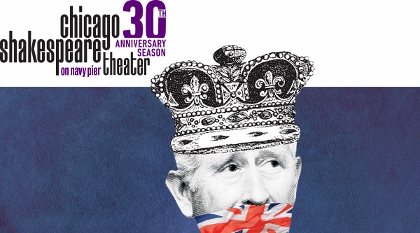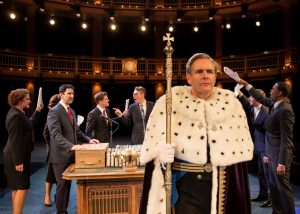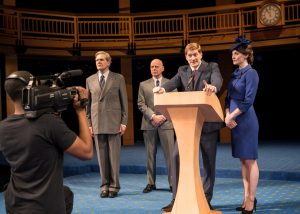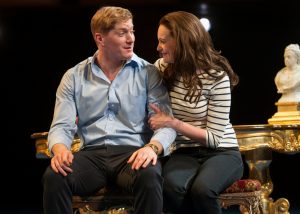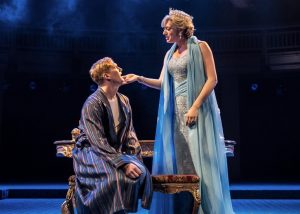“THE VERY BEST WE NEVER HAD”
After reviving the Bard’s stirring chronicles in Tug of War, Chicago Shakespeare Theater has mounted another history play. Except this one reveals future history, not the Hundred Years War or War of the Roses, and, though it’s in blank verse, it’s not Shakespeare. Engagingly staged by Gary Griffin, King Charles III, Mike Bartlett’s 2014 West End hit, peers into the immediate decades to speculate, both magnificently and melodramatically, about the merits of the monarchy.
The timely result is a 150-minute carnival of ambiguity. Here the right things are done in the wrong way for the wrong people. An audience must choose sides’”and nothing less is at stake than the retention or rejection of royalty itself. Are they empty figureheads, costly and anachronistic encumbrances, so many Madame Tussaud waxworks? Or can they employ the power of prerogative to, ironically, check the people’s undemocratic impulses? (Either way the House of Windsor loses badly.)
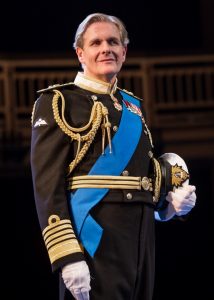 Are royalty so set apart that their mystique (“We must never shine daylight on magic”) must be preserved at all cost? Or, as Walter Bagehot also said, does the head of state have a duty to dissent? (Interestingly, if Hitler-loving Edward VIII had not abdicated in 1937, a much uglier dust-up might have occurred between the monarch and his ministers.)
Are royalty so set apart that their mystique (“We must never shine daylight on magic”) must be preserved at all cost? Or, as Walter Bagehot also said, does the head of state have a duty to dissent? (Interestingly, if Hitler-loving Edward VIII had not abdicated in 1937, a much uglier dust-up might have occurred between the monarch and his ministers.)
You could say the plot hinges on a constitutional crisis, except the British have no constitution (specifically here, no bill of rights). Therein lies the conflict, as a newly crowned king takes his throne all too seriously. At long last succeeding his ancient mother Elizabeth II, with a doggedly loyal consort Camilla (Kate Skinner) replacing the once and future Diana Spencer (Sarah Chalcroft as a trickster ghost), Robert Bathurst (best known as Sir Anthony Strallan in Downton Abbey) is an anomaly, a ruler with a conscience. He will assert his sovereignty and his ideals by opposing (as in refusing to sign) a controversial bill to limit the freedom of the often-reckless British press. (Though it’s set in the future, the play feels dated as it references the spy scandals involving the late News of the World and similar overreaching by Rupert Murdoch-style gutter journalism.)
Oddly, both the Labour Party prime minister (Sean Fortunato) and the Conservative opposition leader (David Lively) oppose their king and, for reasons never made clear, back the censorious proposal. They’re astonished that, after suffering so much himself from tabloid paparazzi and bottom-feeding Fleet Street miscreants, the king should feel otherwise. If Charles doesn’t sign the bill into law, perhaps another edict will be passed to dispense with the king’s required assent or even his right to interfere in politics.
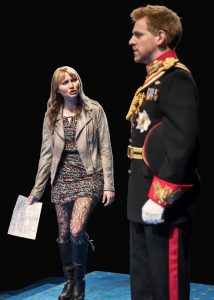 But this third Charles, like the first one, will brook no insubordination from his subjects. Like that ancestor, he will even dissolve Parliament to force both sides to rethink their dangerous legislation. (Another curiosity: England has some of the world’s harshest libel laws, not even requiring proof of slanderous intent in order to prohibit or punish publication. This reactionary bill seems a tad redundant.)
But this third Charles, like the first one, will brook no insubordination from his subjects. Like that ancestor, he will even dissolve Parliament to force both sides to rethink their dangerous legislation. (Another curiosity: England has some of the world’s harshest libel laws, not even requiring proof of slanderous intent in order to prohibit or punish publication. This reactionary bill seems a tad redundant.)
Inevitably, the other royals, manipulated by pragmatic instincts or secret agendas, get drawn into the impasse. Tired of empty ritual and poisonous isolation, blueblood badboy Prince Harry (Alec Manley Wilson) is in love with a republican commoner (Rae Gray), now threatened with blackmail by a gossip reporter. Harry wants to chuck ceremony for real life. But, given his military mindset, will the redhead sacrifice a private passion for his princely responsibilities?
Yoked to a ruthless, Lady Macbeth-like Catherine (Amanda Drinkall), Prince William (Jordan Dean), heir to the throne, remembers how his grandmother E II tolerated a hateful Margaret Thatcher, swallowing any craving to counter the Dragon Lady, and a Tony Blair who defended Diana. He imagines himself a Machiavellian mediator between an intractable Buckingham Palace and a Parliament passing as the people. Intent on preserving the throne, William wants “stability” above all: Niceties like freedom of expression, especially for the fiends who hounded his mother to death, are more trouble than they’re worth.
Bartlett is skillful at fleshing out this clash of wills, with challenged loyalists like the Speaker of the House and chief of defense (Lawrence Grimm), royal press secretary (Jonathan Weir), and head cop (Sam Pearson) caught in the crossfire (specifically a tank strategically placed outside the palace). By play’s sensational end Bartlett questions the value of the crown itself.
At times a soap-operatic rollercoaster, King Charles III wonders whether a king who speaks his heart can be afforded or endured. Happily, we enjoy a lively story along the polemical way. The royal household, government and people are well represented with almost Shakespearean inclusiveness. Never succumbing to caricature, the performances are persuasive, often passionate.
Well, not all of them: In the title role, Bathurst powerfully conveys Charles’s cocksure convictions but he lacks gravitas. We found him more a Wodehouse upper-class twit than a moral force to balance the venal censors of Westminster. As career politicians ripe to take the short view in any ethical dilemma, Fortunato and Lively could easily pass for American compromisers of the Beltway persuasion. The royal family, alas, are just as ig-noble as the Daily Mail could desire: Freedom of the stage matches freedom of the press any night. God save Charles III (because England won’t)!
photos by Liz Lauren
King Charles III
Chicago Shakespeare Theater
Courtyard Theater on Navy Pier
ends on January 15, 2017
for tickets, call 312.595.5600 or visit Chicago Shakes
for more shows, visit Theatre in Chicago
